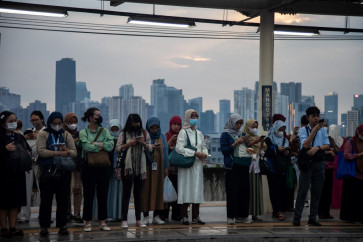Popular Reads
Top Results
Can't find what you're looking for?
View all search resultsPopular Reads
Top Results
Can't find what you're looking for?
View all search resultsNew forms of cheating found in college tests
The National Selection Committee overseeing the joint admission test for state universities has discovered new methods of cheating employed by students throughout the country
Change text size
Gift Premium Articles
to Anyone
T
he National Selection Committee overseeing the joint admission test for state universities has discovered new methods of cheating employed by students throughout the country.
'Based on our investigation, we have found that students have turned to other cheating methods this year, like using Bluetooth pencils and communication devices in the form of metal bracelets, to receive answers from others,' the chairman of the National Selection Committee, Akhmaloka, told The Jakarta Post on Thursday.
Akhmaloka, who is also a Bandung Institute of Technology (ITB) rector, said the examination supervisors caught two students cheating with the metallic bracelets at the Islamic State University (UIN) Syarief Hidayatullah in Jakarta.
Meanwhile, another supervisor spotted a student cheating with a Bluetooth pencil when taking an examination held at the University of Indonesia (UI) in Jakarta.
'These two forms are relatively new compared to those used last year, where students cheated with walkman music players and headsets,' he said. 'We will investigate these findings.'
Rochmat Wahab, the chairman of the Yogyakarta selection committee, told the Post that two out of 32,441 students were spotted cheating by supervisors. The students wore metallic bracelets capable of receiving answers from other people, he said.
'We disqualified the two students from the exam and interviewed them to find out who had sold them the bracelets,' he said.
He said that supervisors had a right to question students taking the examination if they had adequate evidence that the students might be cheating.
'The supervisors aren't allowed to stop students during the tests because that would disrupt the testing overall. The supervisors usually question the suspected students after the exam is over,' he said.
Separately, the Education and Culture Ministry's director general of higher education, Djoko Santoso, told the Post that the ministry gave right to each university to take action if cheating was uncovered in the exam.
'Cheating proves that society does not have enough confidence with its skills and abilities,' he said.
According to Akhmaloka, 590,000 students from around the country are vying for 90,000 available seats in the 62 state universities through the joint admission test. The percentage of places for students who pass the state university selection process through this written test was 40 percent last year. This year, the quota has slightly decreased to 30 percent.
The joint entrance test for state universities, which measures general basic skills in subjects like math, Indonesian, English as well as natural science and general science tests, were held simultaneously throughout the country from June 18 to 19.
The total number of seats available at state universities this year is around 300,000.
Thirty percent of the seats are for students who apply through the national entrance examination, 50 percent are through the merit-based selection process, and the rest are through independent enrollment tests held by individual
universities. (tam)










